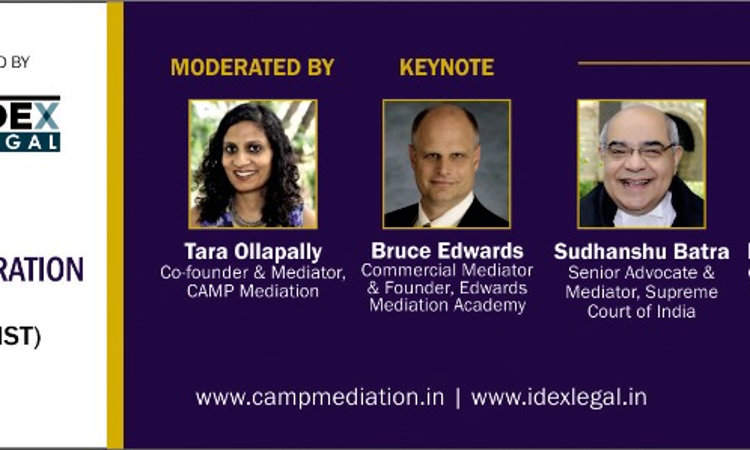How do Lawyers Refer Mediation to clients?
Prasanna Mysore & Tara Ollapally
24 Aug 2021 11:00 AM IST

We had the recent privilege to participate in a panel discussion on "Pitching Mediation to Clients" organized by CAMP and IDEX Legal. It was the Inaugural session of a six-session series on the various aspects of Advocacy in Mediation. More information on the Fireside Chat series and the subsequent sessions planned is available HERE
The Panel on Pitching Mediation to Clients comprised persons of diverse competencies who shared the same objective – how do you successfully pitch mediation. Tara Ollapally, co-founder of CAMP, ably steered the conversation among a seasoned mediator (Sudhanshu Batra), a disputes specialist (Raj Panchmatia), a family office specialist (Shreya Rao) and a former General Counsel (Prasanna Mysore). Below are some of the key take-aways from this discussion :
1.Timing to Propose Mediation is critical
While mediation is best introduced at the early stage of a dispute, it is important to first win the trust of your client before proposing mediation. Raj cautioned that lawyers run the risk of inadvertently communicating that the client does not have a strong case, if mediation is proposed too early in consultation. Proposing mediation after establishing the trust of your client that you can defend strongly in court by demonstrating a sound understanding of the case; engaging in a strong analysis of the reality in court or proposing mediation after necessary filings in court or arbitration were some of the strategies used by our panel to effectively propose mediation.
2. Help your client see the value proposition in mediation
The keynote speaker, Bruce Edwards highlighted the effectiveness of helping clients see the value proposition of mediation in bringing them to the table. While helping parties understand the cost of conflict – both actual and collateral costs – to get them to the mediation table is extremely important, helping them see the value proposition of mediation is an equally important way to bring parties to mediation.
Mediation is an interest based process that allows parties to 'write their own judgement'. Helping clients see the value of control over outcome or the value of a quick resolution from the perspective of moving the business forward or the value in freeing a business team from litigation that will allow enhanced productivity of the team are some of the ways to help clients see the value proposition of mediation as a way to bring them to the mediation table.
3. Familiarize yourself with Mediation
Sudhanshu stressed that lawyers, themselves, must be familiar with the process before attempting to convince their client of the same. Lawyers training themselves in Advocacy in Mediation programs, consulting a mediator to understand the process before pitching mediation to a client or as suggested by one of the participants, retaining a mediator (who would not serve as the neutral in the case) to support the lawyer/law firm to bring in the party to mediation were some of the points raised in the discussion.
4. Mediation as the First Port of Call for General Counsels
Prasanna Mysore (Pras) emphatically underscored the value proposition of mediation for In- house legal teams. Having been a GC for more than three decades, he has had a ring side view of innumerable disputes. Mediation allows In-House legal teams to bring their unique perspective from being a party to the contract formation to being a part of the dispute resolution process. According to Pras, since the GC takes the call on how to deal with litigation, he/she has the ability to stand back and keep the powder dry while recommending mediation.
Convincing management of mediation through an in-depth Cost-Benefit analysis is an assured way to get the needed buy in from management to try mediation. He was strongly of the view that legal teams should use mediation as the first port of call. The challenge of addressing the dispute and yet ensuring continued performance is met by taking recourse to mediation and so, a GC should pitch for mediation at the first opportunity he/she gets.
GC's can further empower themselves to unhesitatingly use mediation by :
a. Taking a mediation pledge so that it becomes part of dispute resolution strategy
b. Ensure mediation clauses in all contracts
5. Understand the true needs of your client
Identifying the real needs of your client is a critical way to appropriately pitch mediation. For example, for family businesses, where relationships and confidentiality are very important, mediation is an ideal forum to pursue. Identifying the right member within the family or company to propose mediation is also a factor to bear in mind when proposing mediation. Shreya Rao, a partner with AZB Mumbai who works closely with family offices, shared the strategy she used to pitch mediation to the Mother of the family in a dispute involving the Patriarch of the family and the children. Mediation allowed her to bring in influencers who were not parties in the legal dispute, into the resolution process.
When parties are in dispute they seek the counsel and guidance of their lawyer. The lawyer plays a critical role in guiding his/her client to resolution. The ability of a lawyer to identify the appropriate forum to pursue to help his/her client find the most meaningful solution is the skill of a brilliant lawyer. Mediation has established itself as a highly effective forum for innumerable disputes.
The first step involves the skill of the lawyer to identify the unique aspects of a case that make mediation appropriate and then to build that trust with his/her client to try this new process. Through awareness programs such as this webinar series we hope lawyers build their toolkit to pursue multiple options for their clients.
(Prasanna Mysore is Corporate Consultant, Arbitrator and Mediator, based out of Bangalore. Tara Ollapally is the CEO and co-founder of CAMP Mediation, Bangalore). Views are personal.


